
Billy Bob Thornton is an American actor, filmmaker, singer and songwriter. He received international attention after writing, directing and starring in the independent drama film Sling Blade (1996), for which he won an Academy Award for Best Adapted Screenplay and was nominated for an Academy Award for Best Actor. For his role in A Simple Plan (1998) he was nominated for the Academy Award for Best Supporting Actor. He is also known for his film roles in One False Move (1992), Tombstone (1993), Dead Man (1995), U Turn (1997), Primary Colors (1998), Armageddon (1998), Monster's Ball (2001), The Man Who Wasn't There (2001), Intolerable Cruelty (2003), Bad Santa (2003) and Friday Night Lights (2004).
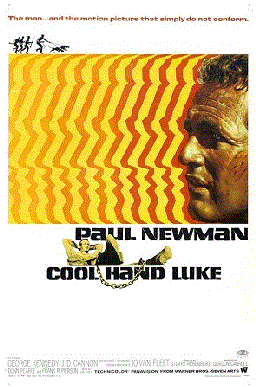
Cool Hand Luke is a 1967 American prison drama film directed by Stuart Rosenberg, starring Paul Newman and featuring George Kennedy in an Oscar-winning performance. Newman stars in the title role as Luke, a prisoner in a Florida prison camp who refuses to submit to the system. Set in the early 1950s, it is based on Donn Pearce's 1965 novel Cool Hand Luke.

Sir Christopher Edward Nolan is a British and American filmmaker. Known for his Hollywood blockbusters with complex storytelling, he is considered a leading filmmaker of the 21st century. Nolan's films have earned over $6.6 billion worldwide, making him the seventh-highest-grossing film director of all time. His accolades include two Academy Awards, a Golden Globe Award and two British Academy Film Awards. Nolan was appointed a Commander of the Order of the British Empire in 2019, and received a knighthood in 2024 for his contributions to film.

Martin Patterson Hingle was an American character actor who appeared in stage productions and in hundreds of television shows and feature films. His first film was On the Waterfront in 1954. He often played tough authority figures. Hingle was a close friend of Clint Eastwood and appeared in the Eastwood films Hang 'Em High, The Gauntlet, and Sudden Impact. He also portrayed Jim Gordon in the Batman film franchise from 1989 to 1997.
Frank Edward Peretti is a New York Times best-selling author of Christian fiction, whose novels primarily focus on the supernatural and spiritual warfare. As of 2012, his works have sold over 15 million copies worldwide. He has been described by TheNew York Times as creating the Christian thriller genre. Peretti is best known for his novels This Present Darkness (1986) and Piercing the Darkness (1989). Peretti has held ministry credentials with the Assemblies of God, and formerly played the banjo in a bluegrass band called Northern Cross. He now lives in Coeur d'Alene, Idaho, with his wife, Barbara.
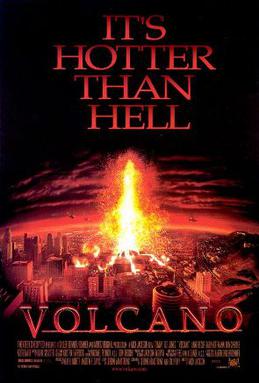
Volcano is a 1997 American disaster film directed by Mick Jackson, written by Jerome Armstrong and Billy Ray, and produced by Neal H. Moritz and Andrew Z. Davis. The film stars Tommy Lee Jones, Anne Heche, Don Cheadle and Keith David. It tells the story of an effort to divert the path of a dangerous lava flow through the streets of Los Angeles following the formation of a volcano at the La Brea Tar Pits. The story was inspired by the 1943 formation of the Parícutin volcano in Mexico.

Reginald Rose was an American screenwriter. He wrote about controversial social and political issues. His realistic approach was particularly influential in the anthology programs of the 1950s.

Mission to Mars is a 2000 American science fiction adventure film directed by Brian De Palma, written by Jim Thomas, John Thomas, and Graham Yost, and suggested by Disney's theme park attraction of the same name. The film depicts the first crewed Mars exploration mission going awry; American astronaut Jim McConnell helps to coordinate a rescue mission for a colleague. Principal support actors were Tim Robbins, Don Cheadle, Connie Nielsen, Jerry O'Connell, and Kim Delaney.
World Wide Pictures (WWP) was a film distributor and production company established as a subsidiary of the Billy Graham Evangelistic Association (BGEA) in 1951. It is involved in the production and distribution of evangelistic films, the production of Graham crusade films, and publicity for Graham crusades.

Dark Castle Entertainment is a film, TV, and digital projects production label. It is owned by North American sports and entertainment company, OEG Inc. The firm is led by co-CEOs Hal Sadoff and Norman Golightly.

The Return of the Texas Chainsaw Massacre is a 1995 American black comedy slasher film written, co-produced, and directed by Kim Henkel. It is the fourth installment in The Texas Chainsaw Massacre film series. The film stars Renée Zellweger, Matthew McConaughey, and Robert Jacks. The plot follows four teenagers who encounter Leatherface and his murderous family in backwoods Texas on the night of their prom. It features cameo appearances from Marilyn Burns, Paul A. Partain, and John Dugan, all stars of the original film.
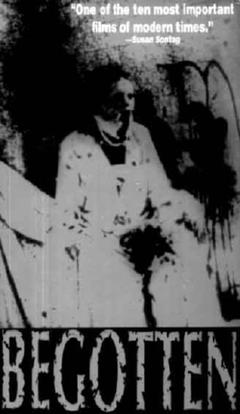
Begotten is a 1989 American experimental silent horror film written, directed, and produced by E. Elias Merhige. It stars Brian Salsberg, Donna Dempsy, Stephen Charles Barry, and members of Theatreofmaterial, Merhige's theatre company. Its unconventional narrative depicts the suicide of a godlike figure and the resulting births of Mother Earth and the Son of Earth, who travel across a barren landscape. The film does not contain dialogue, relying on a visual style evoking early silent films.

The Mist is a 2007 American cosmic horror film directed, written, and co-produced by Frank Darabont. Based on the 1980 novella of the same name by Stephen King, the film stars an ensemble cast of Thomas Jane, Marcia Gay Harden, Laurie Holden, Andre Braugher and Toby Jones.
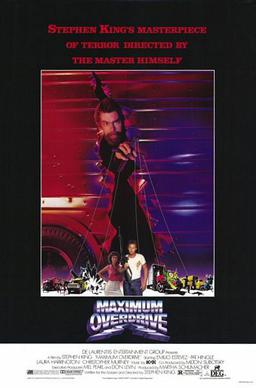
Maximum Overdrive is a 1986 American horror film written and directed by Stephen King, in his only directorial effort. The film stars Emilio Estevez, Pat Hingle, Laura Harrington, and Yeardley Smith. The screenplay was inspired by and loosely based on King's short story "Trucks", which was included in the author's first collection of short stories, Night Shift, and follows the events after all machines become sentient when Earth crosses the tail of a comet, initiating a worldwide killing spree.
Reality film or reality movie describes a genre of films that have resulted from reality television.

The Cutting Edge: The Magic of Movie Editing is a 2004 documentary film about the history and art of film editing, directed by filmmaker Wendy Apple. The film brings up many topics, including the collaborative nature of filmmaking, female representation in the editing field, and emerging technologies of the 21st century. Clips shown in the documentary were taken from feature films of the past century noted for their innovations in editing, ranging from 1903's Life of an American Fireman to 2003's Cold Mountain.
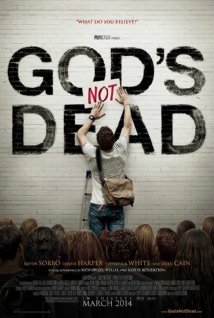
God's Not Dead is a 2014 American Christian drama film directed by Harold Cronk and starring Kevin Sorbo, Shane Harper, David A. R. White, and Dean Cain. Written by Cary Solomon and Chuck Konzelman from a story they co-wrote with Hunter Dennis, and inspired by Rice Broocks' book God's Not Dead: Evidence for God in an Age of Uncertainty, the film follows a Christian college student (Harper) whose faith is challenged by an atheist philosophy professor (Sorbo), who declares God a pre-scientific fiction. The film was produced by Pure Flix Entertainment in association with Check the Gate Productions, Red Entertainment Group, and Faith Family Films, and released theatrically on March 21, 2014, by Freestyle Releasing.

Do You Believe? is a 2015 American Christian drama film directed by Jon Gunn and stars an ensemble cast featuring Ted McGinley, Mira Sorvino, Andrea Logan White, Lee Majors, Alexa PenaVega, Sean Astin, Madison Pettis, Cybill Shepherd, and Brian Bosworth. The film is distributed by Pure Flix, who released it on March 20, 2015.

Full Circle is a 1984 romance novel by American Danielle Steel. It was adapted by Karol Ann Hoeffner into a 1996 television film starring Teri Polo. It is Steel's seventeenth novel.
















